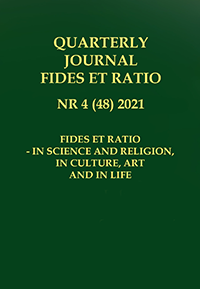Abstract
The aim of the presented study was to Polish version of The State Self-Forgiveness Scale (Wohl i in., 2008) – Skala Epizodycznego Przebaczenia Sobie. The scale is used to assess self-forgiveness after wrongdoing towards self and other persons. The scale consists of 17 items and two subscales describing feelings and actions as well as beliefs towards oneself, which are to lead to self-forgiveness. Four hundred forty four (Mage =27.8, SD=9.9) participated in the study. Both exploratory factor analysis and confirmatory analysis were performed to determine the psychometric properties (RMSEA 0,048, GFI 0,924, PCLOSE 0,556). In order to determine the internal consistency was calculated by Cronbach’s alpha (0,80-0,86). The internal validity was assessed by Heartland Forgiveness Scale. The obtained results showed that the Polish version of The State Self-forgiveness Scale as tool with good psychometric properties and to recommend it for the assessment of self-forgiveness both in research.
References
Bedyńska, S., Książek M., (2012). Statystyczny drogowskaz: praktyczny przewodnik wykorzystania modeli regresji oraz równań strukturalnych, Wydawnictwo Akademickie Sedno, Warszawa.
Charzyńska, E., Heszen, I. (2013). Zdolność do wybaczania i jej pomiar przy pomocy polskiej adaptacji Skali Wybaczania LL Toussainta, DR Williamsa, MA Musicka i SA Everson, Przegląd Psychologiczny, 56, 423-426.
Davis, D.E., Ho, M.Y., Griffin, B.J., Bell, C., Hook, J.N., Van Tongeren, D.R., & Westbrook, C.J. (2015). Forgiving the self and physical and mental health correlates: A meta- analytic review, Journal of Counseling Psychology, 62 (2), 329-335, https://doi.org/10.1037/cou0000063.
Dillon, R.S. (2001). Self-forgiveness and self-respect, Ethics, 112 (1), 53-83.
Enright, R.D. (1996). Counseling within the forgiveness triad: On forgiving, receiving forgiveness, and self‐forgiveness, Counseling and Values, 40 (2), 107-126, https://doi.org/0.1002/j.2161-007X.1996.tb00844.
Fincham, F.D., & May, R.W. (2020). Divine, interpersonal and self-forgiveness: Independently related to depressive symptoms?. The Journal of Positive Psychology, 15(4), 448-454, https://doi.org/10.1080/17439760.2019.1639798.
Germer, C., & Neff, K. (2019). Mindful self compassion (MSC), (in:) Handbook of mindfulness- based programmes, 357-367, Routledge.
Griffin, B.J., Worthington, E.L.,Jr., Davis, D.E., Hook, J.N., & Maguen, S. (2018). Development of the Self-Forgiveness Dual-Process Scale, Journal of Counseling Psychology, 65 (6), 715–726, https://doi.org/10.1037/cou0000293.
Januszewski, A. (2011). Modele równań strukturalnych w metodologii badań psychologicznych. Problematyka przyczynowości w modelach strukturalnych i dopuszczalność modeli, Studia z Psychologii w KUL, 17, 213-245.
Kaleta , K., Mróz, J., & Guzewicz, M. (2016). Polska adaptacja Skali Przebaczenia–Heartland Forgiveness Scale, Przegląd Psychologiczny, 59 (4), 387-402.
Kim, J.J., Volk, F., & Enright, R. D. (2021). Validating the Enright Self-Forgiveness Inventory (ESFI), Current Psychology, 1-14, https://doi.org/10.1007/s12144-020-01248-4.
Kossakowska, M.M., & Kwiatek, P. (2017). Strategia radzenia sobie z krzywdzicielem polska walidacja kwestionariusza TIRM-18, Seminare. Poszukiwania naukowe, 38 (4), 69-82, https://doi.org/10.21852/sem.2017.4.06.
Liao, K.Y.H., & Wei, M. (2015). Insecure attachment and depressive symptoms: Forgiveness of self and others as moderators, Personal Relationships, 22(2), 216-229, https://doi.org/10.1111/pere.12075.
McCullough, M.E., Root, L.M., Tabak, B.A., & Witvliet, C.V.O. (2009). Forgiveness, (in:) S.J. Lopez & C.R. Snyder (eds.), Oxford handbook of positive psychology, 427–435, Oxford University Press.
Mróz, J., Kaleta, K., & Sołtys, E. (2020). Decision to forgive scale and emotional forgiveness scale in a polish sample, Current Psychology, 1-9, https://doi.org/10.1007/s12144-020-00838-6.
Prabhakar, C., Mishra, L.K., Sharma, P., Tiwari, G.K., Pandey, R., Shukla, M., ... & Rai, P.K. (2020). Exploring the similarities and differences in the forgiveness of the elders living in the old-age homes and the families, Authorea Preprints, https://doi.org/10.22541/au.159665991.15556284.
Pandey, R., Tiwari, G.K., Parihar, P., & Rai, P.K. (2020). The relationship between self forgiveness and human flourishing: Inferring the underlying psychological mechanisms, Polish Psychological Bulletin, 23-36, https://doi.org/10.24425/PPB.2020.132649.
Pelucchi, S., Paleari, F.G., Regalia, C., & Fincham, F.D. (2013). Self-forgiveness in romantic relationships: It matters to both of us, Journal of Family Psychology, 27 (4), 541-549, https://doi.org/10.1037/a0032897.
Peterson, S.J., Van Tongeren, D.R., Womack, S.D., Hook, J.N., Davis, D.E., & Griffin, B.J. (2017). The benefits of self-forgiveness on mental health: Evidence from correlational and experimental research, The Journal of Positive Psychology, 12 (2), 159-168, https://doi.org/10.1080/17439760.2016.1163407.
Rohde-Brown, J., & Rudestam, K.E. (2011). The role of forgiveness in divorce adjustment and the impact of affect, Journal of Divorce & Remarriage, 52 (2), 109-124, https://doi.org/10.1080/10502556.2011.546233.
Scherer, M., Worthington Jr, E.L., Hook, J.N., & Campana, K.L. (2011). Forgiveness and the bottle: Promoting self-forgiveness in individuals who abuse alcohol, Journal of Addictive Diseases, 30(4), 382-395, https://doi.org/10.1080/10550887.2011.609804.
Thompson, L.Y., Snyder, C.R., Hoffman, L., Michael, S.T., Rasmussen, H.N., Billings, L.S., & Roberts, D. E. (2005). Dispositional forgiveness of self, others, and situations, Journal of Personality, 73 (2), 313-360, https://doi.org/10.1111/j.1467-6494.2005.00311.x.
Van Prooijen, J.W., & Van Der Kloot, W.A. (2001). Confirmatory analysis of exploratively obtained factor structures, Educational and Psychological Measurement, 61(5), 777-792, https://doi.org/10.1177/00131640121971518.
Webb, J.R., Bumgarner, D.J., Conway-Williams, E., Dangel, T., & Hall, B.B. (2017). A consensus definition of self-forgiveness: Implications for assessment and treatment, Spirituality in Clinical Practice, 4(3), 216 227, https://doi.org/10.1037/scp0000138.
Wohl, M.J.A., DeShea, L., & Wahkinney, R.L. (2008). Looking within: Measuring state self- forgiveness and its relationship to psychological well-being, Canadian Journal of Behavioural Science, 40(1), 1–10, https://doi.org/10.1037/0008-400x.40.1.1.1.
Wohl, M.J., Pychyl, T.A., & Bennett, S.H. (2010). I forgive myself, now I can study: How self- forgiveness for procrastinating can reduce future procrastination, Personality and Individual Differences, 48(7), 803-808, https://doi.org/10.1016/j.paid.2010.01.029.
Wohl, M.J., & Thompson, A. (2011). A dark side to self‐forgiveness: Forgiving the self and its association with chronic unhealthy behavior, British Journal of Social Psychology, 50 (2), 354-364, https://doi.org/10.1111/j.2044-8309.2010.02010.x.
Woodyatt, L., & Wenzel, M. (2013). Self-forgiveness and restoration of an offender following an interpersonal transgression, Journal of Social and Clinical Psychology, 32 (2), 225-259, https://doi.org/10.1521/jscp.2013.32.2.225.
Woodyatt, L., & Wenzel, M. (2014). A needs-based perspective on self-forgiveness: Addressing threat to moral identity as a means of encouraging interpersonal and intrapersonal restoration, Journal of Experimental Social Psychology, 50, 125-135, https://doi.org/10.1016/j.jesp.2013.09.012.
Woodyatt, L., Worthington, E.L., Wenzel, M., & Griffin, B.J. (2017). Orientation to the psychology of self-forgiveness, (in:) Handbook of the psychology of self-forgiveness, 3-16, Springer, Cham, https://doi.org/10.1007/978-3-319-60573-9_1.

